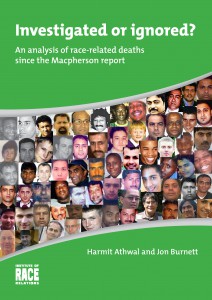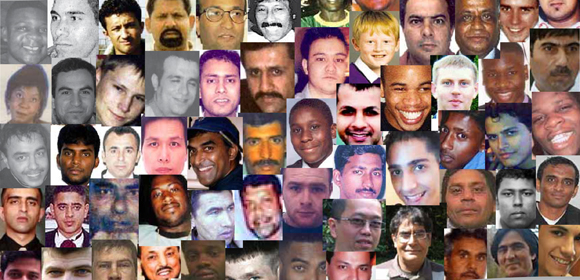Today, the Institute of Race Relations publishes a report that shows serious deficiencies in the criminal justice system’s response to race-related killings.
Since the publication of the Macpherson report in 1999, into the racist murder of Stephen Lawrence, at least ninety-three people have lost their lives as a result of racially motivated attacks (or attacks with a known or suspected racial element) in the UK, according to research by the IRR. The criminal justice system’s response to these deaths is analysed in a new report: Investigated or ignored? An analysis of race-related deaths since the Macpherson report.
The Macpherson report was the catalyst for a multitude of changes in the way the police and criminal justice system respond to racial violence. But as this investigation shows, racial motivation is often still ignored, downplayed or not acknowledged by criminal justice agencies. As the report documents:
- There have at least been ninety-three deaths with a known or suspected racial element since February 1999. Of these, 97 per cent of the victims were from BME communities (including those from Gypsy or Traveller communities and European migrant workers).

- In 84 per cent of cases there was a conviction of some kind – though not necessarily for murder or manslaughter. In only a quarter of the cases was the allegation of racism accepted and prosecuted as such; with racial motivation factored into the sentencing of the perpetrator(s).
- If the relevant authorities, including the police, had on occasion intervened earlier when persistent harassment and low-level abuse was being reported by victims, some deaths could have been prevented.
- Where there are convictions, the racially motivated aspect of cases is being filtered out by the police, the CPS and the judiciary, through a failure to understand the broader context within which racist attacks are carried out, an unwillingness to recognise racial motivation and the reclassifying of racist attacks as disputes, robberies or other forms of hostility.
- The over-strict interpretation of the legal definition of racial motivation may inhibit the charging of perpetrators by removing the racial basis of a crime from the court room.
- Families still have to resort to challenging the decisions of the police, mobilising the media, exerting pressure to ensure the recognition of racial harassment and, ultimately, challenging the criminal justice system.
‘These ninety-three deaths are the most brutal indicator of the continued reality of violent racism in the UK’, said the report’s co-author Jon Burnett. ‘But this investigation shows how those in the criminal justice system are defining racism out of a case, or simply failing to acknowledge racial violence in the first place. In the most extreme cases we have documented, families have had little option but to resort to challenging the actions of a criminal justice system which has appeared indifferent to the impact of racist attacks. If Metropolitan police commissioner Bernard Hogan-Howe wants to restore confidence between the police and BME communities in the wake of the Mark Duggan verdict, it means meeting the policing concerns of these communities.’
RELATED LINKS
Read an IRR report Racial violence: facing reality here
Read an IRR report Racial violence: the buried issue here
Read an IRR News story: ‘Trust comes from accountability‘

